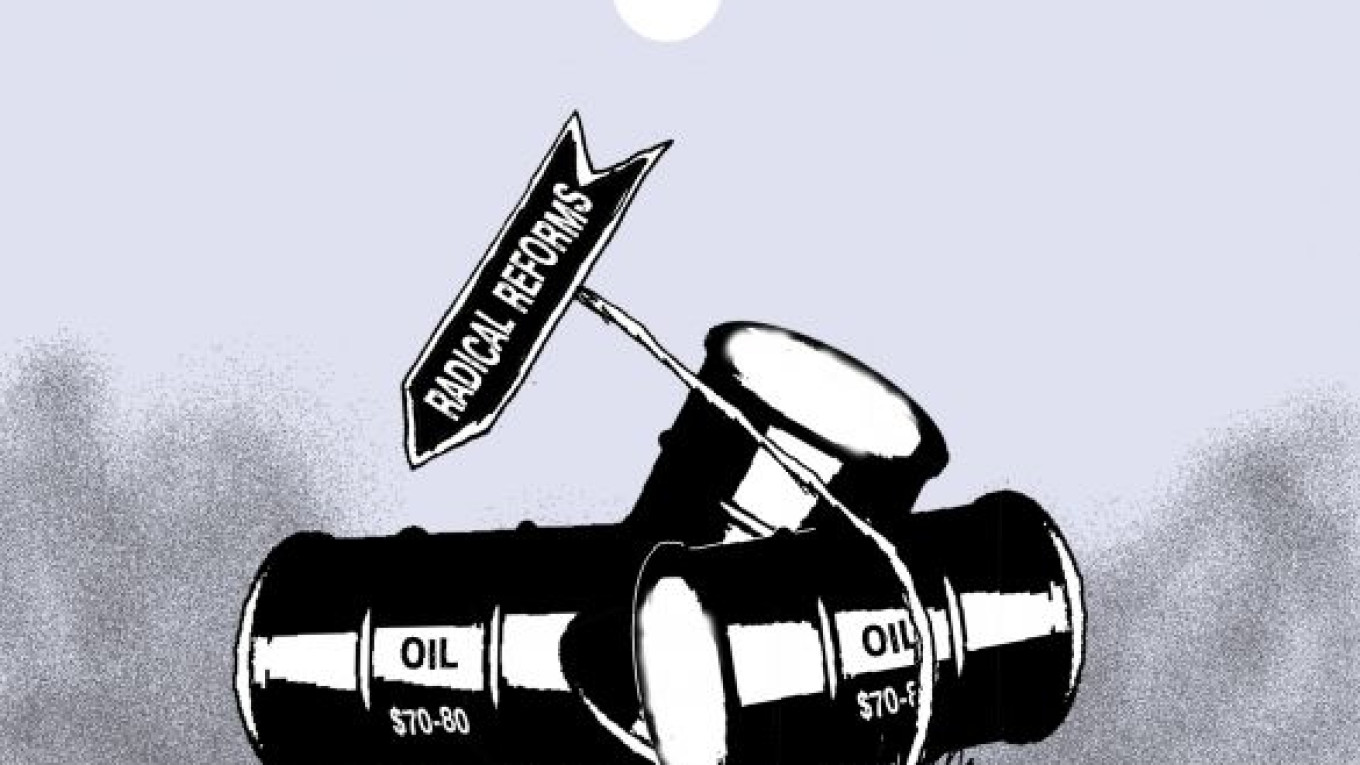Can Russia escape the “resource curse” implied by high oil prices, or will it succumb to what we call a “70-80” scenario? That is the question confronting Russians today, and we fear that their fate will be the “70-80” scenario. If oil prices remain at $70 to $80 per barrel, Russia is likely to relive key features of the Brezhnev era of the 1970s and 1980s — with a stagnating economy and 70 percent to 80 percent approval ratings for its political leaders.
The resource curse means, of course, that Russian elites will prefer to postpone restructuring the economy and modernizing the country’s political and economic institutions. This will undermine economic performance, making it very unlikely that Russia will catch up with advanced economies in the next 10 to 15 years, as officials promise.
Fast and sustainable economic growth requires the rule of law; accountable, meritocratic and noncorrupt bureaucrats; protection of property rights; contract enforcement; and competitive markets. Such institutions are difficult to build in every society. In Russia, the task is especially problematic, because the ruling elite’s interests run counter to undertaking it.
In post-crisis Russia, the resource curse is reinforced by two factors. First, a massive renationalization since 2004 has left state-owned companies once again controlling the commanding heights of the economy. These firms have no interest in developing modern institutions that protect private property and promote the rule of law. Second, Russia’s high degree of economic inequality sustains the majority’s preference for redistribution rather than private entrepreneurship.
Russia’s leaders acknowledge the need for modernization and pay it frequent lip service, as is evidenced by President Dmitry Medvedev’s manifesto “Go, Russia!” But the incentives to escape the resource trap are weakened by the overwhelming importance of the resource rents to the wider political elite.
When the economy was near collapse during the recent crisis, we thought that the government would recognize the need to push ahead with radical reforms that would eventually lead to a diverse, de-centralized and fast-growing economy. But, while stimulus policies were mostly effective in dealing with the immediate crisis, they did not address the long-term issues that impede growth.
Still, the government continues to tout plans to boost the economy. Vertical industrial policy, horizontal industrial policy, investment in education — all have been tried in the last 10 years. Yet Russia’s public institutions remain as weak as ever (for example, corruption is as prevalent as it was 10 years ago, if not more so), and the economy is no less dependent on commodity prices.
Today’s economic silver bullet is an innovation city in Skolkovo that the government hopes will spur inflows of modern technology. But there are no magic recipes for modernization. Moreover, there is no need to reinvent the wheel. A comprehensive and consistent reform plan was already included in then-President Vladimir Putin’s own economic agenda at the beginning of his first term in 2000.
The so-called Gref program (named after former Economic Development and Trade Minister German Gref) foresaw many of the reforms that are vitally needed — privatization, deregulation, accession to the World Trade Organization and reform of the government, natural monopolies and social security. Many of these reforms are outlined in the current government’s own “Long-Term Strategy for 2020.” The problem is that — as with the Gref program in 2000— the strategy is unlikely to be fully implemented, owing to the same old weak incentives.
Even the recently announced privatization of noncontrolling stakes in the largest state-owned firms — while timely and laudable — will not create an irreversible commitment to reform. So far, the government does not want to let control over these firms get into private hands. Hence, the sales that Prime Minister Putin announced will not increase the demand for pro-market institutions.?
By contrast, the “70-80” scenario seems increasingly likely. In June, during the St. Petersburg International Economic Forum, participants in two sessions — Russian government and business leaders, as well as influential foreign players — were asked about the future of Russia’s economy. The results were drearily similar. In one session, 61 percent of participants foresaw stagnation in the next two to five years (33 percent predicted growth and 5 percent expected a crisis). In the other session, 55 percent of participants foresaw stagnation in the next 10 years (with 41 percent projecting growth and 4 percent expecting collapse).
The factors that drove the Putin era of rapid economic growth — high and rising oil prices, cheap labor, and unused production capacity — are all exhausted. Russia will thus be forced to start spending the reserves that saved the economy in the recent crisis. The “70-80” scenario will preserve the status quo, but eventually the economy will reach a dead end, at which point the only choice will be genuine economic reform or decline and dangerous civil disorder.
Aleh Tsyvinski is professor of economics at Yale University, and Sergei Guriev is rector of the New Economic School in Moscow. (c) Project Syndicate
A Message from The Moscow Times:
Dear readers,
We are facing unprecedented challenges. Russia's Prosecutor General's Office has designated The Moscow Times as an "undesirable" organization, criminalizing our work and putting our staff at risk of prosecution. This follows our earlier unjust labeling as a "foreign agent."
These actions are direct attempts to silence independent journalism in Russia. The authorities claim our work "discredits the decisions of the Russian leadership." We see things differently: we strive to provide accurate, unbiased reporting on Russia.
We, the journalists of The Moscow Times, refuse to be silenced. But to continue our work, we need your help.
Your support, no matter how small, makes a world of difference. If you can, please support us monthly starting from just $2. It's quick to set up, and every contribution makes a significant impact.
By supporting The Moscow Times, you're defending open, independent journalism in the face of repression. Thank you for standing with us.
Remind me later.


